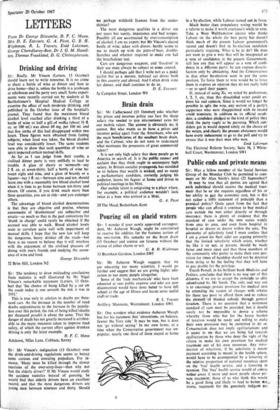Drinking and driving
LETTERS
From Dr George Discombe, D. F. C. Mann, Mrs D. E. Estcourt, G. A. Picot, G. B. H. Wightman, R. L. Travers, Enid Lakeman, George Chowdharay-Best, Dr I. G. M. Hamil- ton, Thomas Frankland, D. G. Christopherson.
Sir: Really. Mr Vinson (Letters. 13 October) should learn not to write nonsense. It is no crime to share a bottle of wine at dinner and then to drive home—that is, unless the bottle is a jeroboam or rehoboam and the party very small. Some experi- ments were recently carried out by students at St Bartholomew's Hospital Medical College to examine the effect of such moderate drinking, and published in the October issue of the hospital's journal. They found that the maximum blood alcohol level reached after drinking a third of a bottle of wine or half a gill of vodka (about 34- fl. oz. or 100 ml.) was about 60 mg. per 100 ml. and that five sixths of this had disappeared within two hours. These figures were obtained from fasting subjects; when food was taken, the blood alcohol level was considerably lower. The same students were able to show that such quantities of wine or spirit impaired certain manual skills.
As far as I can judge from their results, a civilised dinner party is very unlikely to lead to trouble. A glass of sherry or vermouth—say 2 fl. oz. at seven-thirty, half a bottle of wine be- tween eight and nine, and a glass of brandy or a liqueur—say I fl. oz.—between nine and ten. should leave one with a reasonably low blood alcohol level when it is time to go home between ten-thirty and eleven. Of course, if you drink much more than these quantities, you are at risk—and you endanger others.
The advantage of blood alcohol determinations is that they are objective and precise, whereas assessments of 'drunkenness' are subjective and erratic—so much so that in the past convictions for 'drunk in charge' could rarely be obtained if the accused was able to walk. Blood alcohol levels seem to correlate quite well with impairment of manual skills. I hope that the new law will keep the dangerous, heavy drinker off the roads—but there is no reason to believe that it will interfere with the enjoyment of the civilised pleasure of dining with one's friends and studying the asson- ance of wine and food.


































 Previous page
Previous page